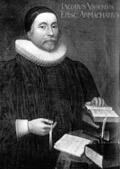the First Week of Lent
Click here to join the effort!
Historical Writings
The historical timeline splits into two main groups: B.C. ("before Christ") and A.D. (Latin phrase "anno domini," which means "in the year of our Lord"). These labels were not fully implemented and accepted until several centuries after Jesus' death.
However, when calculating the B.C. / A.D. system, the developers made a mistake in pinpointing the year of Jesus' birth. Scholars later actually discovered that Jesus was born around 6-4 B.C., not 1 A.D. While not the crucial issue, the birth, life, ministry, death, and resurrection of Christ are the "turning points" in world history. Therefore, since Jesus Christ is the separation of "old" and "new."
Although modern historians now use the labels B.C.E (Before Common Era) and C.E. (Common Era), StudyLight.org will still use the originals.
By Era (2 total)
B.C. (Before Christ)
A.D. (Anno Domini)
By Category (4 total)
The Annals of the World

James Ussher
James Ussher was one of the most outstanding scholars and theologians of his time. He traveled widely in Britain and Europe in his enduring search for knowledge, seeking the earliest available manuscripts, buying those he could, and copying others. After his death, his extensive and valuable library formed the great library of Trinity College, Dublin.
James Ussher, archbishop of Armagh, was the pre-eminent figure in the contemporary Church of Ireland, and a leading patron of scholarship at Trinity College, Dublin. A staunch defender of episcopacy, he respected all sides during religious upheavals of the 1640s and 1650s, regarded as the person able to achieve an accommodation between the Presbyterians and the "Church of England." As such, he was valued by Hartlib and Dury, both of whom helped him at times with his scholarly work and looked to him as a potential patron for their schemes.
Despite his success as a churchman, Ussher is perhaps most famous for dating the start of the creation to the evening before 23rd October, 4004 B.C. Ussher calculated this timing in his Annals, a work of biblical chronology published in Latin in 1650 (Hartlib noted its progress through the press with great interest) and translated it into English in 1658. The book was the fruit of many years of labor; as early as the summer of 1640, Ussher was reported 'spending constantly all the afternoones' in the Bodleian working at it (Constantine Adams to Hartlib, Hartlib Papers, 15/8/3A-4B).
In the Annals, Ussher developed the chronological work of many earlier scholars, particularly Joseph Justus Scaliger (who had pioneered the use of the Julian period in calendrical calculations) to provide a framework for dating the whole Bible historically. He argued that, although scripture itself only tended to take notice of entire years, the Holy Spirit provided clues allowing critics to establish a precise chronology of its events by applying to the text the results of astronomical calculations and its comparison with the dates of pagan history. Ussher's system had the advantage of preserving several attractive numerical symmetries. For example, the ancient Jewish notion, adopted by Christians, that the creation anticipated the Messiah's birth by 4,000 years. HoweverIt was also heavily dependent on classical chronologies and interpreted the calendar that already seemed out-dated to many scholars.
Although not wholly original, Ussher's work was nevertheless influential. It became widely accepted, not the least, because the dates were later incorporated into the margins of some editions of the Authorized Version. However, Ussher's chronology rested too heavily on the Old Testament's Hebrew text to escape controversy even in his day. Its findings were attacked by those who were persuaded that the Greek translation of the Old Testament (the Septuagint) or the Samaritan Pentateuch (both of which presented different chronologies from the Hebrew) were more reliable witnesses to the dictation of the Holy Ghost, or that they concurred more closely with the evidence of astronomy and pagan history. Yet, in the opinion of Hartlib, and perhaps of many others, Ussher's critics were churlish individuals who were unwilling to admit their debts to his scholarship. Despite such debates, most seventeenth-century readers of the Bible would have agreed with Ussher that it ought, in principle, to have been possible to establish an accurate and detailed biblical chronology.